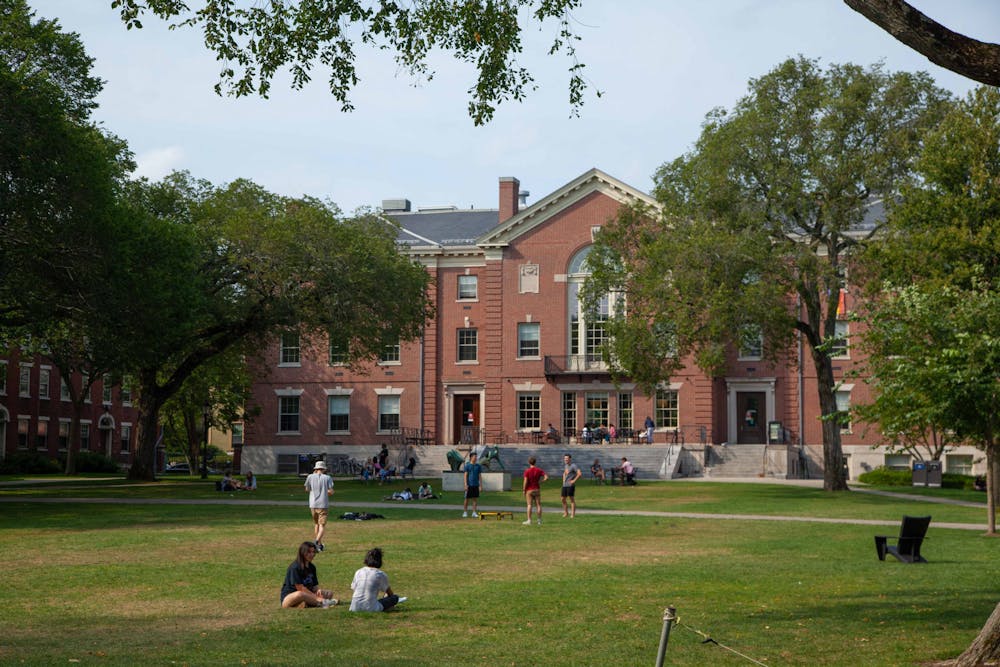When Oleksii Shebanov ’26, an international student from Ukraine, received his admission offer from the University, he was also extended the option to arrive on campus early and attend Brown’s summer session. But due to delays with his visa application, which included traveling to the Czech Republic because the US embassy in Ukraine was closed, Shebanov had to postpone his arrival until July 19.
Shebanov was one of the 13 Ukrainian applicants to the class of 2026 who were offered an “advanced likelihood of admission” in this past regular decision cycle, The Herald previously reported. Logan Powell, dean of admission, wrote in an email to The Herald that 10 out of the 13 applicants accepted the offer, one of whom has deferred their enrollment for a year.
The University supported the accepted students as needed, Powell wrote. For the students who required summer housing, the University offered them early arrival. Four students arrived on campus early, with two of them choosing to matriculate early and take summer courses.
The University also “planned in advance” when it came to helping students apply for visas, Powell wrote. “We made sure that the students had acceptance letters, an I-20 and financial aid from Brown,” he added.
“All first-year Ukrainian students received financial, immigration and navigational assistance before and after they arrived in the U.S.,” wrote Chia-Ying Pan, associate dean of the College for international students, in an email to The Herald. “Students also received a welcome package that (consisted) of life essentials to start their college life at Brown.”
The students that arrived on campus early also received ongoing academic and navigational support from the College and the Global Brown Center for International Students, she added.
“All students were supported by two Meiklejohn peer advisors in both one-on-one and group academic advising sessions,” Pan wrote. Pan also encouraged the students in the cohort to participate in the GBC’s ongoing academic orientation for first-year international students, which will feature programming to help international students use University resources.
“Everything I needed was provided by the University, so it was great,” said Shebanov, who has been permitted to remain on campus over winter break if needed.
The University has provided similar support networks for Ukrainian upperclassmen. Artem Agvanian ’25, who is from the Ukrainian city of Mariupol, said he was offered on-campus housing this past summer, while Artem Kyrylov ’24, an international student from Lithuania who was born Kyiv, Ukraine, said that the University has been open to considering giving him more financial aid.
Kyrylov said he has already met with most of the first-year Ukrainian students. “I was in touch with a few over the summer as they were getting to campus … (in hopes of) providing them some guidance,” he said.
Many of the Ukrainian students on campus also have an active group chat on Telegram, a global instant messaging service, where they discuss both on-campus and at-home events, Kyrylov said.
Kyrylov spent his summer working at an internship in New York City, where he was hosted by the Ukrainian community in the East Village. “While there was always a strong sense of solidarity among the Ukrainian diaspora, it has never felt stronger,” he added.
The same could be said of the Ukrainian students on campus, Kyrylov said, adding that they have formed a “tight-knit community” and actively support one another both emotionally and practically.
Community is important to Shebanov, who still finds it difficult to balance life at the University with checking up on family in Ukraine. “I get up and check the news every day and usually it’s pretty gloomy,” he said. While the news is slowly improving, it is still “mentally hard.”
“It’s nice to have a community from back home here at Brown,” Agvanian said.





